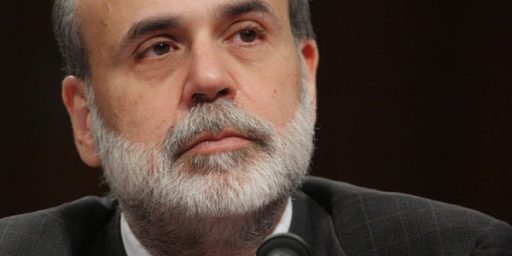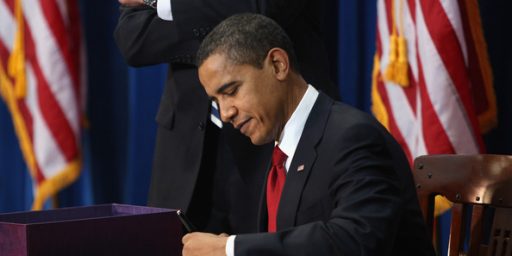Can You Provide Some Evidence Please?
Tyler Cowen describes the debate on the merits of fiscal stimulus so far,
This exchange is a good micro-cosm of how the stimulus debate has proceeded. A highly respected anti-stimulus economist puts up some anti-stimulus evidence in a highly imperfect test (in Barro’s defense, he did cover more than just WWII). The anti-stimulus economist is attacked by pro-stimulus economists. But the pro-stimulus proponents are focused on attack. They are not putting up comparable empirical evidence of their own for the efficacy of fiscal policy and there is a reason for that, namely that the evidence isn’t really there.
Arnold Kling suggested this would be the case,
Overall, on close examination, the case for the large fiscal stimulus, like the case for the Paulson rescue plan, is really quite weak. However, the same elite groupthink that made passage of the Paulson plan inevitable probably also makes the passage of the stimulus package inevitable. Opponents of the stimulus plan will be mocked and vilified in the media, even though they may very well have logic on their side.
And no, it isn’t that the case for fiscal stimulus is rock solid and thus the other side doesn’t have to present any evidence. As Greg Mankiw notes here,
The puzzle is that, taken together, these findings are inconsistent with the conventional Keynesian model. According to that model, taught even in my favorite textbook, spending multipliers necessarily exceed tax multipliers.
How can these empirical results be reconciled? One hypothesis is that that compared with spending increases, tax cuts produce a bigger boost in investment demand. This might work through changing relative prices in a direction favorable to capital investment–a mechanism absent in the textbook Keynesian model.
[…]
My advice to Team Obama: Do not be intellectually bound by the textbook Keynesian model. Be prepared to recognize that the world is vastly more complicated than the one we describe in ec 10. In particular, empirical studies that do not impose the restrictions of Keynesian theory suggest that you might get more bang for the buck with tax cuts than spending hikes.
But there are people who are arguing for at least some caution with regards to fiscal policy. Take for example Professor Edward Leamer’s postion,
It is more accurate and more intellectually healthy to think of ourselves as trading greater prosperity in the next year or two for less prosperity later on. Let’s proceed with handouts and bailouts that greatly reduce the severity of the current recession at the lowest possible future cost. But let’s top throwing cash at anything that doesn’t move, as if being hit with money would get it moving again.
This is in response to Krugman’s “boneheaded” mistake (Leamer calls it an undergraduate level mistake) that increasing the deficit is not big deal since we largely owe the money to ourselves.
Leamer is certainly correct though. We don’t live in a closed economy and we depend on foreign investors to fund at least a portion of our deficits. Krugman’s view that there is nothing to worry about the sky’s the limit on the deficit, the assumption is that foreigners are essential an endless source of money with which we can fund our deficits.
When borrowing takes place it transfer consumption from the future to the present. In short, it reduces future well being. For an individual the issue is a personal one: are you happier knowing that your future consumption and well being will be lower, but that your consumption and well being will be higher today. But when you are talking about a government you are not talking about inter-generational transfers of wealth. Apparently it is okay to take money from say our children (most of whom don’t even have jobs yet) and consume it now. It strikes me as rather odious when we use that future consumption to reward people who have behaved in an irresponsible manner (invested recklessly, purchased a large expensive house without having the income to justify such a purchase, etc.).
Then there is Alan Auerbach who also voices some reasons to be cautious.
Undertaking expansionary fiscal measures now while showing no interest in dealing with our long-term fiscal problem could lead investors to question our ability to confront that problem later, and that loss of confidence could have an immediate impact.
In other words, reckless and unbridled expansionary fiscal policy is not an option. We have the problem with Medicare for one. That huge fiscal imbalance combined with taking a veiw that we can borrow as much as we want might induce foreigners not to buy U.S. government bonds. And as both Gary Burtless and Isabel Sawhill note much of the current U.S. government debt is held by foreigners. If they stop buying we’ll have to offer the debt at a higher interest rate and that is not a good thing.
It seems to me there is plenty of room to disagree on how much fiscal stimulus there should be and what shape it will take. The evidence in favor of fiscal stimulus is not so clear cut. There are reasons why we might not want to just throw money at the problem. Calling people who voice concern or raise objections to various proposals stupid and such is childish.






I think it pretty clear that no one really knows what to do, including doing nothing as an option. There is no strong case for any approach. Economists work best when they have prior models to examine. The Great Depression is a mixed model with no clear answers.
The silver lining here is that conservatives/Republicans have rediscovered deficits. The national debt has consistently gone up since 1980 whenever a Republican president has been in office.
Steve
I think we’re nearly on the same page, Steve. See my comment to your last post.
Though I have no faith that any such claim is true, I’m hoping you’re right.
But I’m doubtful. If Obama offered a 4% cut in the marginal tax rate and a 10% cut in the capital gains tax I’m certain that both the GOP in congress as well as, sadly, OTB, would come out in favor of it.
Regardless of it’s effect on the current record budget deficit.
Why?
You know why.
What would stimulate me is witnessing “the most ethical congress ever” holding the “smartest man in congress” somewhat accountable for the banking crisis. Oh well, yes I’m a dreamer.
I am not an economist. That said, if I had to suggest policy for a way out of this mess, I’d look at how Japan botched their situation and how Sweden fixed theirs. Also, I would listen to economists who got it right, like Paul Krugman, and avoid people who don’t understand economics, like basically anyone on the GOP side.
BTW, I have to note that the comment sections here are full of liberals. As a liberal, I’ll suggest that the reason is because OTB is one of the few conservative sites that is not completely insane (“Barack is a muslim/ He’s a Kenyan / William Ayers / Vince Foster / etc”) and so liberals feel like there’s a chance they can dialogue with the other side here.
Don’t lose that, OTB guys. Don’t go wingnut on us.
“Also, I would listen to economists who got it right, like Paul Krugman, and avoid people who don’t understand economics, like basically anyone on the GOP side.”
You were saying something about nut cases?
Someone remind me please what the Verdon Plan is? Abolish Social Security & Medicare? Eliminate the capital gains tax?
I liked what Tyler Cowen quoted from Warren Buffett the other day — that economists don’t actually always know what they’re talking about, so try some of everything and see what works. (The FDR approach, which is one reason so many economists never forgave FDR.)
Buffett, I think, has a bit more credibility than most of Obama’s critics, most of whom seem to be Thoreau’s “ducks of one idea,” quacking SPENDING BAD or some other truism that has about as much chance of being true to the complexity of the national economy as creationism does to the complexity of the natural world.
That would be fine if we were dealing with intellectually honest people. We aren’t so we can’t do this. To think we can is naive in the extreme.
It isn’t my fault you haven’t read some of my ideas on what to do if something is going to be done.
Did you read the responses to Buffet? Here is an analogy.
You have a sick patient and Doctor Obama comes in and says, “Lets get to work. First, lets crack open the patients chest and get working on the heart. Call the nuerosurgeon we need to get working on the brain ASAP. Prep the patient for an enema and a vasectomy. Nurse, I need to start this patient on an IV drip of morhpine. Where is that eye doctor so we can test for vision problems. I think we’ll need to amputate the left foot.”
Now, at the end of doing all this at once what do you think is going to happen to said patient? The outcome probably wont be good is my guess.
Or let me restate the liberal position:
Nobody knows what to do, so we’ll just spend $1 trillion dollars we don’t really have and hope that works.
Great plan!